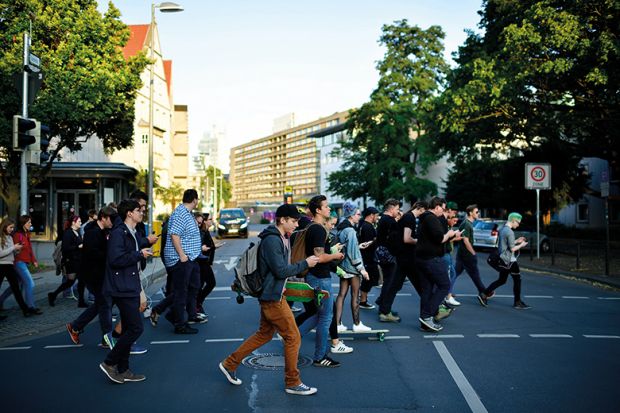Students who “take a break” from an intellectually demanding task by turning to their mobile phones are failing to “recharge their brains” and improve their performance.
That is the clear conclusion of research carried out by Terri Kurtzberg, associate professor of management and global business at Rutgers Business School, and doctoral candidate Sanghoon Kang, and now published in the Journal of Behavioral Addictions.
To look at the refreshing effect of different kinds of breaks, they gave 414 undergraduates 20 anagrams to solve. Halfway through the task, most of them were asked to stop and select three items from a shopping list, using either a mobile phone, a paper flyer or a computer.
The researchers then measured “cognitive depletion” by looking at how long it took the students to solve the second set of 10 anagrams. The results were very clear: “those in the cell phone break condition took [19 per cent] longer in the second half of the task than those who took other breaks”. Even worse, “there was no statistical difference between those who took cell phone breaks and those who took no break at all”, meaning that mobile phone breaks offered none of the “cognitive recharging” one might hope for.
Moving on the students’ level of success in solving the anagrams, the researchers found a similar story, with “those in the cell phone break condition solv[ing 22 per cent] fewer problems in the second half of the task as compared to those” in all the other break conditions combined.
The paper, “Reach for your cell phone at your own risk: The cognitive costs of media choice for breaks”, also cites earlier research that some people are “so connected with their phones [that they] experience ‘phantom vibration syndrome’ [and] mistakenly imagine that a phone has sent a message alert”.
Asked about her recommendations for avoiding such addictive behaviour, Dr Kurtzberg said that she “personally do[es] not allow [her] students to have phones out during class”. She added: “Some have even commented to me on what a pleasant surprise it has been to learn so well in a class without their phones!” Academics too, particularly “during moments of real thinking (such as when writing)”, ought to “put the phone in a drawer until you’re at a stopping point. And whenever looking at the phone, remember to leave yourself more transition time afterwards to return to other tasks.”
Register to continue
Why register?
- Registration is free and only takes a moment
- Once registered, you can read 3 articles a month
- Sign up for our newsletter
Subscribe
Or subscribe for unlimited access to:
- Unlimited access to news, views, insights & reviews
- Digital editions
- Digital access to THE’s university and college rankings analysis
Already registered or a current subscriber? Login





